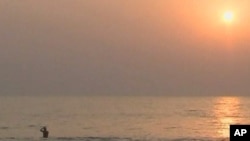Once a booming tourist destination for Europeans looking for a small stretch of tropical paradise, Sierra Leone is better known these days for its post-war struggles to develop. But many here believe that the tourist trade is just about to take off again.
The clean white sand, warm ocean and tropical backdrop of the No. 2 River Beach is a short if bumpy ride south of Sierra Leone's capital, Freetown. A well-known secret among expatriots and locals, many feel this beach symbolizes Sierra Leone's tourism trade - little-known, unspoiled, beautiful, and slightly difficult to get to.
Jim Dean, an American expat who works for a USAID-funded project here, says this beach is special.
"It's kind of an unspoiled area. If you pan in on the hills behind us, this is all the Western reserve, this is what's left of the rainforest in this part of Sierra Leone," he explained. "So all of us who live here and really enjoy this environment would like to see it promoted as an eco-tourism destination rather than turned into another Jamaica with big hotels, restaurants and bars."
But for the community association running the No 2. River Beach Resort, the weekend crowds from Freetown are only just enough to sustain their business.
Daniel Macauley heads the association that has successfully reinvested profit back into the business and into developing the nearby village. High youth unemployment and a beautiful beachside setting prompted the community to set up the resort fifteen years ago. Now the association wants to expand.
"Our future plans is actually to make sure that this resort becomes an eco-lodge - so that it will be internationally known, people will be coming from outside, that will make more money obviously and it will also be part of means of youth to be employed in this community," he said.
Macauley says United Nations and NGO workers come in smaller numbers these days. So he hopes to attract international tourists to the resort instead.
But challenges for Sierra Leone's tourism industry remain significant. Road infrastructure is poor and prices are often relatively high for transport and lodging. There are few charter flights and a return ticket on a commercial airline can cost over $1,000.
Bimbola Carrol runs a local tour company, Visit Sierra Leone, and an online forum that addresses traveler's concerns about going to Sierra Leone.
"For tour operators such as myself, I think the biggest challenge undoubtedly is the image that Sierra Leone has outside of the country," he said. "I think during the years of the conflict a lot of negative images came out and it is very difficult to change those opinions that people have held about Sierra Leone."
The country's civil war ended almost eight years ago, but many Westerners still associate the country with images of the conflict's violence and brutality. The 2006 Hollywood film Blood Diamond - set during the war - became the reference point for millions of viewers.
Though nowhere near the height of the 1980s tourism boom, the Tourist Board says numbers are steadily rising. More than 5,000 people came to Sierra Leone on holiday last year. The first guidebook was published last year and two UK-based tour operators are now organizing trips to Sierra Leone.
Caryl Canzius is a tourist visiting from Toronto, Canada. As she watches the sun set over Freetown's Lumely beach, she says Sierra Leone surprised her.
"I'd say my first impression people here are very kind, the land is beautiful, the beaches are absolutely amazing," she said. "I was one of those people that was a little afraid but now I've been here I've seen that it is quite stable and very safe as well. So pleasantly surprised."
Bimbola Carrol says he is confident that in a few years time, Sierra Leone will be back on the tourism map. On the wall behind him, a poster depicting pristine beach advises, "Discover Sierra Leone Before Everyone Else Does".
The Tourism Board says tourism currently generates approximately $20 million. As the country moves from post-conflict to investor-friendly destination, tourism could have a significant impact on the economy of one of the poorest countries in the world. If only they can convince people to come.
Related report by VOA's Scott Stearns




